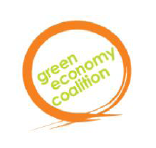 January 2012: The Green Economy Coalition (GEC) has published the January edition of its monthly newsletter, which contains updates on the Coalition’s latest activities. It also explains the newsletter’s plans in the lead-up to the UN Conference on Sustainable Development (UNCSD, or Rio+20).The GEC Convenor highlights that the green economy is already transformative because “it is bridging and clarifying an alternative development path for the developing nations” and also “growing stronger and more viable even in the more reluctant G20 countries…,” due to rising resource and energy prices and worsening environmental and social conditions. He underlined the Coalition’s role as creating space for different stakeholders, including governments, corporations and the civil society, to debate and work together to accelerate green and fair economies.
January 2012: The Green Economy Coalition (GEC) has published the January edition of its monthly newsletter, which contains updates on the Coalition’s latest activities. It also explains the newsletter’s plans in the lead-up to the UN Conference on Sustainable Development (UNCSD, or Rio+20).The GEC Convenor highlights that the green economy is already transformative because “it is bridging and clarifying an alternative development path for the developing nations” and also “growing stronger and more viable even in the more reluctant G20 countries…,” due to rising resource and energy prices and worsening environmental and social conditions. He underlined the Coalition’s role as creating space for different stakeholders, including governments, corporations and the civil society, to debate and work together to accelerate green and fair economies.
The newsletter also outlines the Coalition’s five themes of change and describes efforts to distil these themes into “big ideas,” as requested by the Coalition’s Global Meeting held at the end of 2011. According to the newsletter, these big ideas should: respond to the global conversations but also build on the Coalition’s constantly evolving thinking; be transformative; and help form new agreement and action among the Coalition and other partners of what should be pursued at Rio+20 and beyond.
The newsletter notes that each month, it will lay out the questions the big ideas must answer to, and start to define them with contributions from partners. The five themes of change and the big idea questions are as follows: Governance and Metrics – How to measure what matters; Influencing financial flows – How to ensure long term investment confidence in the green economy; Investing in people – Can managing natural assets create jobs for the rural poor and alleviate rural poverty?; Investing in nature – How to look after the natural world; and Greening economic sectors – How to create resilient and resource efficient industries. Next month’s newsletter will focus on the first question. [Publication: January 2012 Newsletter]